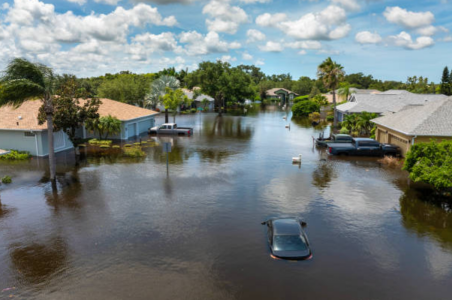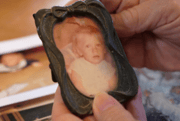New scams target flood victims, risk rises for more losses
By
Gian T
- Replies 0
When disaster strikes, Aussies are known for rolling up their sleeves and helping each other out.
But sadly, not everyone is so neighbourly. In the wake of the devastating NSW floods, a new wave of scams is targeting those already doing it tough, leaving many at risk of losing more than just their homes and possessions.
If you or someone you know has been affected by the recent storms, staying vigilant is more important than ever.
Consumer advocacy group Choice.com.au has sounded the alarm: scammers are out in force, preying on vulnerable people when they’re at their lowest.
One of the most common scams after a natural disaster is the appearance of so-called 'disaster chasers'—unverified tradespeople who show up unannounced, offering to fix your home or property on the spot.
They might seem like a godsend, but beware: these operators often demand immediate payment, refuse to show credentials and don’t bother confirming anything with your insurer.
Even worse, if they do any work at all, it’s often shoddy and could leave you ineligible for future insurance claims.
Insurers are urging everyone to be cautious: don’t make snap decisions based on a knock at the door.
Always check a tradie’s licence through your state’s official registry and confirm with your insurer before letting anyone start repairs.
You need to watch out for more than dodgy tradies.
Scammers also pretend to be from banks, government agencies, and charities.
With banks offering relief measures like payment deferrals, fraudsters are seizing the opportunity to trick people into handing over personal details or transferring money.
Remember: your bank will never ask for your login details, PIN, or verification codes via text, phone, or email.
If you get a suspicious message, don’t reply—contact your bank directly using the number on their official website.
The same goes for government agencies like myGov or the ATO.
They won’t call or email you out of the blue demanding personal information or payment for made-up debts.
If you’re ever unsure, check the request through the official government website or call their verified service number.
In the aftermath of the floods, many Aussies want to help out by donating to relief efforts.
Unfortunately, scammers are taking advantage of this goodwill by setting up fake fundraising campaigns—sometimes even impersonating well-known charities on social media and asking for gift card donations.
To ensure your donation goes where it’s needed, always check the Australian Charities and Not-for-Profits Commission (ACNC) register to confirm the organisation's legitimacy.
Official disaster support websites will also list approved donation channels.
The NSW floods are just one part of a string of severe weather events hitting Australia in 2025.
According to the Insurance Council of Australia, more than 126,000 insurance claims have already been lodged this year, with insured losses approaching a staggering $1.5 billion.
With so much money on the line, it’s no wonder scammers are circling.
To protect yourself and your loved ones, take time before agreeing to repairs—always check the tradie’s credentials and confirm with your insurer first.
Be cautious of unexpected contact, whether it’s by phone, text, or email, and never share personal information unless you're sure of the person’s identity.
Before donating, verify the charity using the ACNC register or official disaster support sites to ensure it’s legitimate.
If you suspect any suspicious activity or believe a scam has targeted you, report it right away to your bank, insurer, or the appropriate government agency.
Remember, in tough times, we’re stronger together. Stay safe, stay smart, and let’s keep an eye out for each other!
In other news, Australians slammed a social media ad that exploited the recent cyclone for a giveaway.
A text message from Torque Crew mimicked an emergency alert before shifting to a vehicle and cash prize promotion. You can read more about it here.
 Have you or someone you know been approached by a dodgy tradie, fake charity, or scammer after the floods? What steps do you take to protect yourself from scams? Share your experiences and tips in the comments below—your story could help someone else avoid becoming a victim.
Have you or someone you know been approached by a dodgy tradie, fake charity, or scammer after the floods? What steps do you take to protect yourself from scams? Share your experiences and tips in the comments below—your story could help someone else avoid becoming a victim.
But sadly, not everyone is so neighbourly. In the wake of the devastating NSW floods, a new wave of scams is targeting those already doing it tough, leaving many at risk of losing more than just their homes and possessions.
If you or someone you know has been affected by the recent storms, staying vigilant is more important than ever.
Consumer advocacy group Choice.com.au has sounded the alarm: scammers are out in force, preying on vulnerable people when they’re at their lowest.
One of the most common scams after a natural disaster is the appearance of so-called 'disaster chasers'—unverified tradespeople who show up unannounced, offering to fix your home or property on the spot.
They might seem like a godsend, but beware: these operators often demand immediate payment, refuse to show credentials and don’t bother confirming anything with your insurer.
Even worse, if they do any work at all, it’s often shoddy and could leave you ineligible for future insurance claims.
Insurers are urging everyone to be cautious: don’t make snap decisions based on a knock at the door.
Always check a tradie’s licence through your state’s official registry and confirm with your insurer before letting anyone start repairs.
You need to watch out for more than dodgy tradies.
Scammers also pretend to be from banks, government agencies, and charities.
With banks offering relief measures like payment deferrals, fraudsters are seizing the opportunity to trick people into handing over personal details or transferring money.
Remember: your bank will never ask for your login details, PIN, or verification codes via text, phone, or email.
If you get a suspicious message, don’t reply—contact your bank directly using the number on their official website.
They won’t call or email you out of the blue demanding personal information or payment for made-up debts.
If you’re ever unsure, check the request through the official government website or call their verified service number.
In the aftermath of the floods, many Aussies want to help out by donating to relief efforts.
Unfortunately, scammers are taking advantage of this goodwill by setting up fake fundraising campaigns—sometimes even impersonating well-known charities on social media and asking for gift card donations.
To ensure your donation goes where it’s needed, always check the Australian Charities and Not-for-Profits Commission (ACNC) register to confirm the organisation's legitimacy.
The NSW floods are just one part of a string of severe weather events hitting Australia in 2025.
According to the Insurance Council of Australia, more than 126,000 insurance claims have already been lodged this year, with insured losses approaching a staggering $1.5 billion.
With so much money on the line, it’s no wonder scammers are circling.
To protect yourself and your loved ones, take time before agreeing to repairs—always check the tradie’s credentials and confirm with your insurer first.
Be cautious of unexpected contact, whether it’s by phone, text, or email, and never share personal information unless you're sure of the person’s identity.
If you suspect any suspicious activity or believe a scam has targeted you, report it right away to your bank, insurer, or the appropriate government agency.
Remember, in tough times, we’re stronger together. Stay safe, stay smart, and let’s keep an eye out for each other!
In other news, Australians slammed a social media ad that exploited the recent cyclone for a giveaway.
A text message from Torque Crew mimicked an emergency alert before shifting to a vehicle and cash prize promotion. You can read more about it here.
Key Takeaways
- Scam activity has surged in NSW communities hit by floods, with unverified tradespeople offering unsolicited repairs and demanding upfront payment without proper credentials or insurer approval.
- Insurers are urging customers to verify the licences of any tradespeople and confirm all contractor affiliations with their insurer before going ahead with repairs to avoid losing future insurance coverage.
- Authorities and banks are warning flood-affected individuals about impersonation scams, as fraudsters may pose as bank staff, myGov or ATO representatives, attempting to extract personal details or payments via text, phone, or email.
- Several fraudulent fundraising campaigns have emerged, prompting advice to check donation requests against the ACNC register or official disaster support channels to ensure contributions go to legitimate charities.








